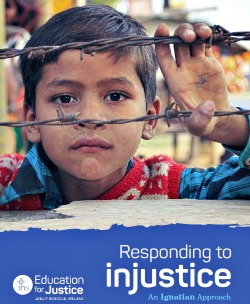While there is no universal definition of what justice is, the daily manifest of images and stories of injustice from across Ireland and the world is unambiguously clear. As Christians, we hold dear the notion that justice is closely associated with fairness and that we should always seek to form just and fair relationships; however, we also know justice is much more than this.
{youtube}rBvKjNsTG0A{/youtube}
The concept of justice is best understood when we recognise God’s intention when He created the world; He wanted it to be a just place – where everything flourished. As we have been created to live justly in our connection to God, Creation, and Humanity, justice is not only about living properly and making good and honest relationships, it is also about our commitment to respond to injustice, ensuring that all of us flourish on this Earth.
Responding to Injustice: An Ignatian Approach provides students with the opportunity to do just this. Grounded in Christian Values and an Ignatian Charism, this module sets out to foster ‘a spiritual vision of the world in the face of materialism, a simplicity in the face of consumerism, and a concern for others in the face of egoism and injustice’ (Characteristics of Jesuit Education, Jesuit Institute, London, 2014).
The module consists of twelve sequential lessons leading to a concrete response. The lessons comprise an array of teacher-led,student-led, individual and group activities. The use of visual images, audio-visual clips, questions, worksheets, role plays, reflection, meditation, and class discussions demonstrate this. While the module is generally aimed for Junior Cycle Religious Education students, it can be taught as a stand-alone Transition Year module and within the Senior Cycle Religious Education curriculum.
Developed within the framework of the Education for Justice and Reconciliation Programme, (Jesuit Schools, Ireland) this module seeks to inspire a ‘Faith that does Justice’, thus upholding the Jesuit educational objective which is to ‘form men and women for others … men and women of competence, conscience, and compassionate commitment.’
It is hoped that teachers will find this a useful resource in opening their student’s eyes to the realities of the world, igniting within them a desire to ‘reach out in compassionate service’ and in effect, developing their capacity to right the wrongs of our world whilst at school and beyond.


